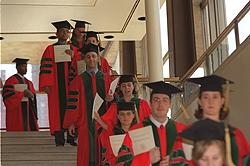
Procession of graduating students from the Medical College.
Joint Commencement ceremonies for Weill Medical College and Graduate School of Medical Sciences of Cornell University were held on May 24 in Avery Fisher Hall at Lincoln Center.
The Medical College conferred 88 M.D. degrees, and the Graduate School of Medical Sciences conferred 33 Ph.D. degrees and five M.S. degrees. (Eight of the M.D. graduates had previously received Ph.D. degrees as graduate students in the Tri-Institutional MD-PhD Program jointly sponsored by the Medical College, the Graduate School of Medical Sciences, and The Rockfeller University.)
More than half of the new M.D.'s are women (53%), and 14% are members of underrepresented minority groups. The new M.D.s will begin their residency training at many of the leading academic medical centers in the U.S., with more than 80 percent having received a residency "match" with one of their top three preferred institutions. About 80 percent of the Ph.D. graduates will pursue postdoctoral research at leading biomedical research centers.
President Rawlings' Remarks
Hunter Rawlings, president of Cornell University, was the principal Commencement speaker. "Whether you are physicians or biomedical researchers, you enter your field at an auspicious time," said President Rawlings. "We are beginning to understand health and disease at a very basic level and to develop interventions and treatments based on that knowledge. Many of you contributed to the advancement of biomedical knowledge through your research at Weill Cornell. With your ambition and your passion for your work—which you have raised to a very high level here—you will continue to advance medical knowledge with a subtlety and a precision unimaginable even today."
Despite its promises for the future, however, science has its limits, Rawlings noted. "It is worth remembering—with humility and compassion—that no matter how many advances research in the biomedical sciences achieves, it will not cure death. As the baby boomers age—and we are aging in spite of heart-healthy diets, health club memberships, collagen injections and Viagra—you who begin your biomedical careers today are going to be dealing with a large number of us—and our families—confronting pain, suffering and death. At best, biomedical research will delay the final outcome, allowing us, as someone put it, 'to die young as late as possible.'"
The establishment of a location of the Medical College in Qatar, President Rawlings noted, represents an important expansion of the internationalization of medicine that has been a hallmark of educational programs at Weill Cornell. "Many of our students come here from other nations, and nearly half of our medical students take a medical elective in a foreign country. The Qatar initiative builds on that interest to make Cornell a major player in international medicine, and it is likely to become a model for other institutions. I want to commend Dean Gotto for his vision in seizing this opportunity, which was extended to us by invitation of the Qatar Foundation, and I want to commend the faculty for reviewing the invitation carefully and for giving it their enthusiastic endorsement."
Student Speakers
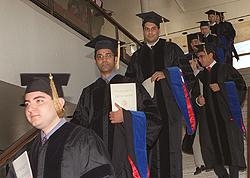
Procession of graduating students from the Graduate School of Medical Sciences.
Michael Stern from the Medical College and Joan Adamo from the Graduate School of Medical Sciences represented their classes as the student speakers.
Dr. Stern shared his thoughts on what the future may hold for the Class of 2001: "I have no doubt that in this exciting time of rapid advances in knowledge and technology, opportunity awaits us in every corner of medicine, and we shall accomplish great things. As we pursue our respective future ambitions and hopes, if we can learn to embrace the journey and not the destination, we will be able to slow down to focus on the essential human connections within a day and there find a richness, a meaning, and, often, a comfort. Our patients will help guide us, for they always lay bare the intimate conditions of their lives. And so we must become astute and respectful listeners, not only as doctors, but also as people." In the next arduous stage of their training as residents, he noted, "there may be moments, amidst the joyous highs, when we feel so fatigued and challenged as to wonder why we should continue on, chained to the millstone of our dreams. For me, I know I will regain my spirit and footing by thinking about you all, spread out across the country, this constellation of doctors-in-training with whom I share a special fellowship borne of the struggles and triumphs of this amazing journey."
In her remarks, Dr. Adamo focused on the graduates' future responsibilities as scholars, mentors and leaders in biomedical science: "As scholars, we have already published our research in respected journals. We have solved crystal structures, identified novel proteins, and elucidated intracellular mechanisms. But it certainly will not end here. In the future, the person sitting next to you might be the one who develops a vaccine to stop the spread of AIDS, or they might pioneer a method for curbing the rancorous effects of tuberculosis. We might have the inventor of the next life-saving surgical procedure here with us today, or the scientist who makes the next advancement in chemotherapy or cancer treatment." As mentors, she noted, "we are no longer the student, the apprentices; we need to be able to aptly guide the next generation. We should offer sage advice, but also know when to let go. We must not forget that in order to teach and to train, we can never stop learning ourselves. There are certainly going to be many people from whom we can learn. Treat each new encounter with another scientist as a chance to learn about their work and accept their thoughts on your work." Leadership, she said, will be needed to communicate the broader significance of scientific advances. "In a time of rapidly developing science, where the public is often scared or confused about the implications of what science will be able to accomplish, we need to be ever more vigilant in our education of the public. As leaders in the scientific community, we need to be able to communicate our ideas with not just other scientists, but also with all types of people."
Alumni Honors Go to Kapikian and Szeto
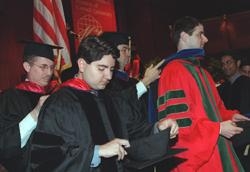
Faculty assist M.D. and Ph.D. students in donning the "hoods" that signify the doctoral degree.
Honored as the recipient of the Medical College's Alumni Award of Distinction was Albert Kapikian, who received his M.D. from the Medical College in 1956. Hazel Szeto, who received both her M.D. and Ph.D. degrees in 1977, received the Alumni Award of Distinction from the Graduate School of Medical Sciences. (See separate article in this Dean's Bulletin.)
Weill Medical College
Doctors of Medicine: Class of 2001
Jodi L. Accaria
Martin L. Birch
Juliet E. Brause *
Daryll H. Brosanders
Melissa L. Brosanders
David Canes
Andria B. Cardinalli-Stein
Soo Yun Chun
Jesse A. Chusid
Julie D. Clark
Jules A. Cohen
Joshua S. Dines
Angelica R. Espinosa
Susan K. Fish
Jessica Fleischer-Black
David W. Galarneau
Bethany Gentilesco
Gayle Friedland Glik
Daniel Goldin
Jessica R. Goldstein
Rajiv Gupta
Stephaine M. Hale
David J. Hass
Elizabeth Hechavarria
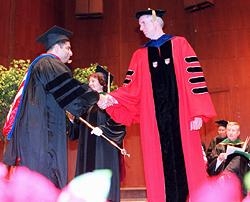
Cornell University President Hunter Rawlings congratulates each of the graduating students.
Todd L. Hicks
Tobias M. Hohl **
Chandra M. Ivey
James L. Izanec
Jai Jayaraman
Marjorie N. Jean
Sarah B. Johnson
Elliott M. Kanner **
James O. Keating
Judith R. Kelsen
Steve S. Kim
Karyn B. Kolman
Darlene D. Lin
Qing Liu
Michelle H.-M.Loy
Denise K. Marciano **
Maurice Markus **
Rotonya L. McCants *
Stephanie L. Mick
Rebecca A. Miksad *
Edward P. Miranda
Jill A. Morganstern
An T. Nguyen
Teri D. Nguyen
Michael M. Ohebshalom
Zeph Okeke
Matthew E. Prout
Elaine J. Rabin
Jay D. Raman
Anil Ranawat
Faith C. Reeves
Jhanelle E.A. Rhoden
Venus R. Rivera
Charles Y. Ro
David M. Rodin *
Miriam Romero
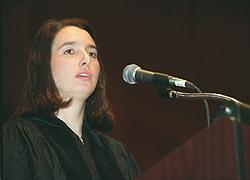
Student speaker for the Graduate School of Medical Sciences, Joan Adamo.
Victor A. Rosenberg
Jennifer S. Ross
Maura E. Ryan *
Judit Saenz-Badillos *
Sandra Loeb Salsberg *
Poorab K. Sangani
William J. Savage *
Parinda N. Shah
Michael U. Shiloh **
James D. Slover
Sarah M. Snelgrove
Joshua D. Stein
Michael E. Stern
Jennifer C. Tang
Sanjay K. Vanguri
Anjali Varma **
Mark A. Vecchiotti
Robin A. Vora
Lawrence W. Weber
Elena Wechsler
Marcus L. Williams
Jordan M. Winter *
Jeffrey B. Wise
Brian R. Wong **
Alison Z. Young **
Yvonne Zaharakis
Jill R. Zimmer
Carrie L. Zinaman-Ernst
* Received the M.D. degree with honors in research
** Cornell/Rockefeller/Sloan-Kettering Tri-Institutional MD-PhD Program graduate
Weill Graduate School of Medical Sciences
Doctors of Philosophy: Class of 2001
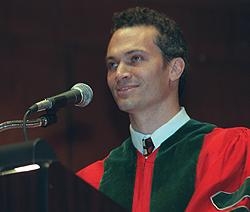
Student speaker for the Medical College, Michael Stern.
August 21, 2000
Behzad Aghazadeh
Hui Cai
Tobias Hohl
Cindy Levine
Yufeng Peng
Mary Srethapakdi
Anne Wright
January 17, 2001
Virginia Carrington Bromleigh
Roger Sheng-Chieh Lo
Yong-Chao Ma
Thomas A. McAvoy
Elena S. Mossessova
Sigrid Anne-Barbara Rajesekaran
Gerson Rothschild
Andrew Wen-Yuan Tai
Joseph R. Tumang
May 24, 2001
Joan E. Adamo
Richard L. Bennett II
Joseph Demasi
Diana M. Gitig
Sundeep Kalantry
Gus H. Khursigara
Kevin Lehman
David J. Lennon
Chad M. May
Ilhem Messaoudi
S. Sean Millard
Michelle Saehwa Park
András Schaffer
Johannes S. Schlondorff
Gregory St. John
José M. Trevejo
Marc Tritel
Masters of Science: Class of 2001
Kari Dahlen
Kathleen Figaro
Jordan Foster
Gbenga Ogedegbe
Eric Wold

